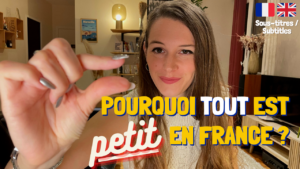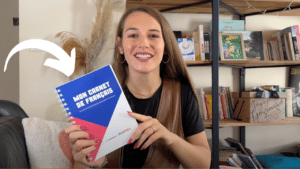Transcript of the video
This morning I received a little postcard.
I also bought a new sweater.
I think I'm going to make a little snack this afternoon.
Mathieu, shall we watch a little film tonight? What's up?
I hope you're all settled in and ready for this new French lesson.
If you've ever spoken to a French person, or heard French people talking to each other, you're bound to have heard the word "petit".
Today, in this video, we're going to talk about this tiny word, but one that takes up a lot of space, because it's used so much in French.
It slips into a lot of sentences without adding much meaning, without really adding much value to a sentence in terms of meaning.
It's often said that the French use the word ****** indiscriminately, in all the situations they encounter on an ongoing basis.
There's another word we use a lot every day in France: petit.
We even use it without realizing it, just slipping it into our sentences, saying it without even thinking about it.
If you too want to give the impression that you're a native French speaker, don't hesitate to slip in this little word.
I'm going to explain in what contexts it's used, so that you too can put it into your sentences in the right way.
As I was saying, this word doesn't make much sense, it's kind of useless.
But yet, it is used all the time, all the time, all the time.
Some foreigners have already said why everything is always small in France?
Of course, you're familiar with the primary use of the word "little" for a boy and "little" for a girl.
It's used to refer to someone who isn't very tall, or to something that isn't big.
Small is the opposite of large, the antonym of big.
If you have a French friend, he or she must have offered you a cup of coffee at least once, or if you went to a restaurant in France, the waiter may have offered you a cup of coffee or a dessert to finish your meal.
When you're abroad, it can be really confusing. It can be complicated because if a waiter offers you a small coffee, you might say no, I'd like a large coffee.
Yet we're not talking about size at all. Just because I say I bought a small sweater doesn't mean it's small. When I say I received a small postcard, it's no smaller than any other.
And when I suggested to Mathieu that he watch a short film tonight, it's not a five-minute film, it's a normal film.
It's just a figure of speech.
But why do the French use this word all the time, which is useless and adds a word to a sentence and, above all, confuses foreigners?
When you use small to qualify something in a sentence, it makes that thing or sentence more positive.
For example, if I say I ate a small cake for a snack, it gives the impression that it's less serious.
That I'll feel less guilty about gaining weight because I ate a cake.
It makes my sentence more positive. So we use it to make the sentence more positive, an action or something more positive.
But more importantly, it's also used to downplay something. It was just a cupcake I ate.
A small cancer? But there is such a thing as a small cancer?
In principle, this means that you may only need a minor operation.
Excuse me but can you stop saying small all the time?
So you see in this excerpt I don't know if you know this series. It's a series on Netflix called "Plan Coeur", set in Paris. I really recommend it because it's a really great French series to watch.
In this extract, you see, one of the characters says she has a little cancer. She says is there such a thing as a little cancer? And the doctor says We'll just have to do a small operation.
She has cancer and has to have an operation. But we use small to make it seem less serious to minimize what's going on.
We use small in sentences to minimize something. So to make it less serious and also to make things a little cuter. In France, we often say that everything small is cute, but we can also use it a little for politeness, to emphasize the fact that we're not pretentious or arrogant.
For example, I'll say I took a little trip to Brazil last year.
It doesn't at all mean that I went to Brazil for two days. I can say I took a short trip, but being away for a month is more to avoid giving the impression that you're pretentious when you say "ah me, I've been to Brazil".
Again, we diminish, we give a little less importance to this thing. For example, I can also say I bought a small iPhone 13.
You've got it right, it's not a miniature iPhone, it's just a figure of speech.
I'm going to say this to downplay, for example, the fact that it was expensive.
So, I'm going to say I bought a small iPhone 13. It's a bit to minimize the price, reassure myself, but it's not that it was smaller than any other phone.
To take the coffee example again, if I say to someone, "How about a cup of coffee? It can also give the impression that it won't last very long, or if a waiter offers it, that it won't cost very much.
If I tell a colleague I've sent you a little e-mail, it could mean, well, that's it, it's not that important.
You can read it when you have time.
You see, we minimize a little bit, always something, but it really depends on the context.
When I said, I bought myself a little sweater, well, it makes it look cute.
Or if I say, I bought a little piece of jewelry for Vanessa's birthday, it's to add a little cuteness, I got her a little something.
That's it for today, I hope you enjoyed this video and understood the use of the word small.
As I've often told you, it's used a little unconsciously to minimize something or to emphasize the fact that something is cute.
But most of the time, we use it as a kind of linguistic tic.
Everything becomes, everything becomes small.
Don't hesitate to let me know in the comments if there are any other words in French whose everyday use is perhaps a bit of a roundabout way.
I hope you enjoyed this video. In any case, if you liked it, don't forget to put a like, it's very important to me and especially if you're new, subscribe and activate the bell so you don't miss any video.
I'll see you very, very soon.








